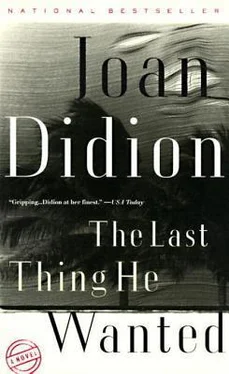“I’m not sure I know what business Epperson is in,” she said.
“Christ, what business are they all in,” her father said.
They would need more blood work before they had a diagnosis, the resident said. The resident was wearing a pink polo shirt and kept his eyes fixed on the nurses’ station, as if to distance himself from the situation and from Elena. They would need a scan, an MRI, they would need something else she did not get the name of. They would of course order a psychiatric evaluation, although evidence of mental confusion would not in itself be a diagnostic criterion. Such mental confusion, if there was mental confusion, was incidental, a secondary complication. Whatever the diagnosis, it would not be uncommon to see a psychotic break with a fever this high in a patient this age.
“He’s not that old,” she said. This was pointlessly argumentive but she disliked the resident. “He’s seventy-four.”
“After retirement you have to expect a deficit.”
“He’s not retired either.” She could not seem to stop herself. “He’s quite active.”
The resident shrugged.
At noon a second resident arrived to do the psychiatric evaluation. He too was wearing a polo shirt, mint green, and he too avoided Elena’s eyes. She had fixed her gaze on the signs posted in the room and tried not to listen, I/O. INFECTIOUS SHARPS ONLY. “This is just a little game,” the psychiatric resident said. “Can you tell me the name of the current president of the United States.”
“Some game,” Dick McMahon said.
“Take your time,” the psychiatric resident said. “Don’t let me rush you.”
“Count on it.”
There was a silence.
“Daddy,” Elena said.
“I get the game,” Dick McMahon said. “I’m supposed to say Herbert Hoover, then he puts me away in the home.” His eyes narrowed. “All right. Wheel of Fortune. Herbert Hoover.” He paused, watching the psychiatric resident. “Franklin Delano Roosevelt. Harry S Truman. Dwight David Eisenhower. John Fitzgerald Kennedy. Lyndon Baines Johnson. Richard Milhous Nixon. Gerald whatever his name was, kept tripping over his feet. Jimmy something. The Christer. Then the one now. The one the old dummy’s not meant to remember. The other old dummy. Reagan.”
“Really excellent, Mr. McMahon,” the psychiatric resident said. “You deserve first prize.”
“First prize is, you leave.” Dick McMahon turned with difficulty away from the resident and closed his eyes. When he opened them again he focused on Elena. “Funny coincidence, that asshole bringing up presidents, which brings us back to Epperson.” His voice was exhausted, matter-of-fact. “Because Epperson was involved in Dallas, that deal. I ever tell you that?”
Elena looked at him. His gaze was trusting, his pale-blue eyes rimmed with red. It had not before occurred to her that he might have known who was involved in Dallas. Neither did it surprise her. She supposed if she thought about it that he might have known who was involved in a lot of things, but it was too late now, the processor was unreliable. An exploration of what Dick McMahon knew could now yield only corrupted files, crossed data, lost clusters in which the spectral Max Epperson would materialize not only at the Texas Book Depository but in a room at the Lorraine Hotel in Memphis with Sirhan Sirhan and Santos Trafficante and Fidel and one of the Murchisons.
“What deal in Dallas is that, Mr. McMahon,” the psychiatric resident said.
“Just a cattle deal he did in Texas.” Elena guided the resident to the door. “He should sleep now. He’s too tired for this.”
“Don’t tell me he’s still here,” Dick McMahon said without opening his eyes.
“He just left.” Elena sat in the chair by the hospital bed and took her father’s hand. “It’s all right. Nobody’s here.”
Several times during the next few hours her father woke and asked what time it was, what day it was, each time with an edge of panic in his voice.
He had to be somewhere.
He had some things to do, some people to see.
Some people would be waiting for him to call.
These things he had to do could not wait.
These people he had to see had to be seen now.
Late in the day the sky went dark and she opened the window to feel the air beginning to move. It was only then, while the lightning forking on the horizon and the sound of thunder created a screen, a safe zone in which things could be said that would have no consequences, that Dick McMahon began to tell Elena who it was he had to see, what it was he had to do. Tropical storm due from the southeast and hard rain already falling. That he could not do it was obvious. That she should undertake to do it for him would have been less obvious.
It is hard now to call up the particular luridity of 1984. I read back over the clips and want only to give you the period verbatim, the fever of it, the counterfeit machismo of it, the extent to which it was about striking and maintaining a certain kind of sentimental pose. Many people appear to have walked around the dead center of this period with parrots on their shoulders, or monkeys. Many people appear to have chosen during this period to identify themselves as something other than what they were, as “cargo specialists” or as “aircraft brokers” or as “rose importers” or, with what came to seem baffling frequency, as “Danish journalists.” This was a period during which many people appear to have known that the way to fly undetected over the Gulf coastline of the United States was low and slow, five hundred to a thousand feet, an effortless fade into the helicopter traffic off the Gulf rigs. This was a period during which many people appear to have known that the way to fly undetected over foreign coastlines was with cash, to buy a window. This was a period during which a significant minority among the population at large appears to have understood how government funds earmarked for humanitarian aid might be diverted, even as the General Accounting Office monitored the accounts, to more pressing needs.
Piece of cake, Barry Sedlow told Elena McMahon.
This was not his personal line of work but he knew guys who did it.
Pick a small retailer in any friendly, say Honduras or Costa Rica. Ask this retailer for an invoice showing a written estimate for the purchase of, say, a thousand pairs of green Lee jeans, a thousand green T-shirts, and a thousand pairs of green rubber boots. Specify that the word “estimate” not appear on the invoice. Present this invoice, bearing an estimated figure of say $25,870 but no indication that it is merely an estimate, to the agency responsible for disbursing said humanitarian aid, and ask that the $25,870 reimbursement due be transferred to your account at Citibank Panama. Instruct Citibank Panama to wire the $25,870 to one or another “broker” account, for example the account of a third-party company at the Consolidated Bank in Miami, an account the sole purpose of which is to receive the funds and make them available for whatever need presents itself.
The need, say, to make a payment to Dick McMahon.
There are people who understand this kind of transaction and there are people who do not. Those who understand it are at heart storytellers, weavers of conspiracy just to make the day come alive, and they see it in a flash, comprehend all its turns, get its possibilities. For anyone who could look at a storefront in Honduras or Costa Rica and see an opportunity to tap into the United States Treasury for $25,870, this was a period during which no information could be without interest. Every moment could be seen to connect to every other moment, every act to have logical if obscure consequences, an unbroken narrative of vivid complexity. That Elena McMahon walked into this heightened life and for a brief period lived it is what interests me about her, because she was not one of those who saw in a flash how every moment could connect.
Читать дальше












